Fur Parent Kicks Out Roommate's Friend After He Harrases Their Dog
For some people, a pet isn't just a pet and a dog isn't just a dog. It's family and something they treat dearly like a child.
Much like being a parent, they'd often buy only the best foods, make sure all their dog's needs are met, give them all the time and energy they can, and, of course, make sure that no harm comes to them no matter what or how. That's why it's understandable why some people would be overprotective of their dogs.
Those creatures mean a lot to them and they won't want anything happening to them. With that, they also expect other people to pay their dogs respect and not intentionally cause them harm.
Unfortunately, as Redditor AddictX120 discovered, not all people think the same way about pets. When his roommate's friend came over, he realized that some people can be a little bit callous and careless around other people's pets.
But he wasn't going to just let it slide. After their guest toyed with their dog in a not-so-friendly way, OP kicked that person out and told his roommate to never let them back inside their home again.
If you're wondering how it quickly got to that point, here's the whole story.
OP asks:

The first red flag was the guy's reaction to the dog's barking which was totally normal given that there were strangers in his home
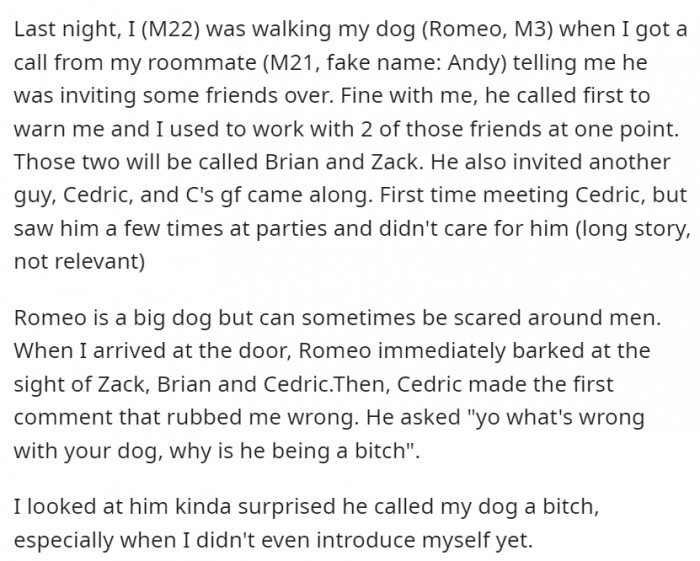
Then he just lit up that lighter on that dog's face like nothing
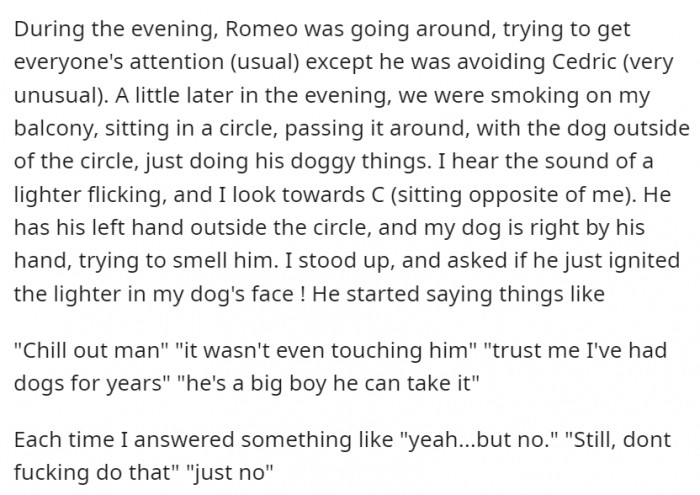
The Psychology of Pet Protection
From a psychological standpoint, the strong response of a pet owner to perceived threats against their pet is rooted in attachment theory.
Dr. Susan Lee, a psychologist specializing in animal behavior, explains that pets often become integral parts of our lives, triggering protective instincts.
This protective behavior reflects deep emotional bonds that can provoke strong reactions when confronted with perceived danger.
Understanding Canine Behavior and Human Interaction
This incident underscores the importance of understanding canine behavior and its impact on human interactions. Research shows that dogs can sense human emotions and react accordingly, which means that how we treat them can significantly influence their behavior.
According to studies published in the Journal of Animal Behavior, negative interactions can lead to increased anxiety and aggression in dogs, which ultimately affects their relationships with humans.
Protective Instincts in Pet Owners
Dr. Angela Smith, a behavioral psychologist at Yale University, points out that protective instincts toward pets often stem from deep emotional bonds formed through companionship.
Her research indicates that pet owners can develop strong attachment styles that mirror those seen in human relationships.
In this case, the fur parent's reaction to the harassment reflects a natural instinct to protect a vulnerable member of their family.
Understandably, the dog's owner got pretty upset over that. Who wouldn't?
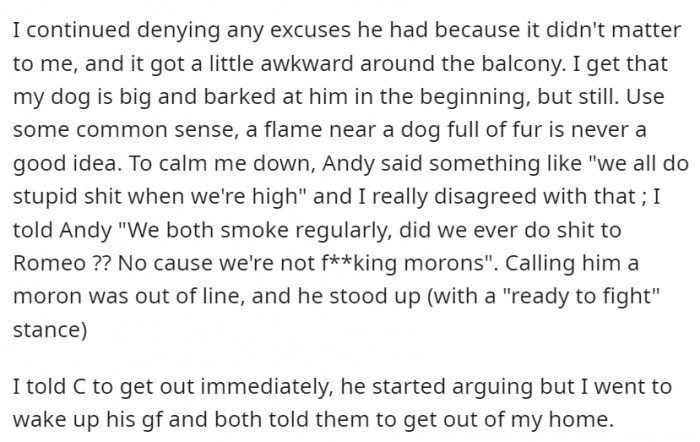
The insult might not have been the best move but what the guy did was also uncalled for
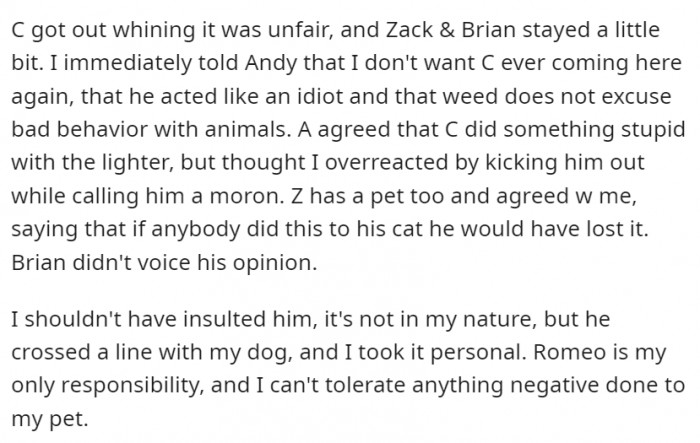
If someone lit up a lighter in your pet's face and even singed their fur or burned a patch of it, would you still be able to laugh it off? Many pet owners would absolutely go to hell and back seeking justice for that because it's a totally mean thing to do.
Even if the person says they were just joking around, it's not a nice joke to do. It's actually cruel and a potentially dangerous thing too.
Fortunately, many people in the comments section agree and have been boosting OP's confidence to have a talk with their roommate. Here are some of the best comments.
1. It's such a simple thing to respect someone else's home and pets

Research indicates that pet owners frequently experience heightened emotional responses when their pets are threatened, similar to protective behaviors seen in parenting.
Understanding this emotional response can illuminate why the Redditor reacted so strongly to the harassment of their dog.
This reaction is often driven by a desire to ensure the safety and well-being of their furry family member.
Moreover, the emotional bond between humans and their pets is profound and can lead to protective behaviors when that bond is threatened. Dr. Karen Overall, a veterinary behaviorist, emphasizes that pet owners often see their animals as part of the family, leading them to act defensively in situations where their pets are mistreated.
Understanding this dynamic is crucial for navigating conflicts involving pet care and treatment.
Studies in animal behavior show that the bond between pets and owners can lead to heightened emotional responses when their pets are threatened.
According to research published in the Journal of Personality and Social Psychology, individuals often view pets as family members, which can intensify protective reactions.
This emotional attachment can lead to significant conflict when others disrespect that bond.
2. It's up to pet owners to create a safe environment for their pets where they can feel perfectly comfortable and at ease
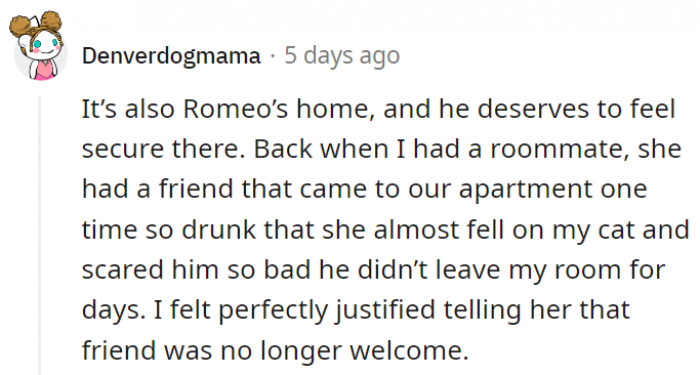
3. If something bad happened, C might have even blamed the dog
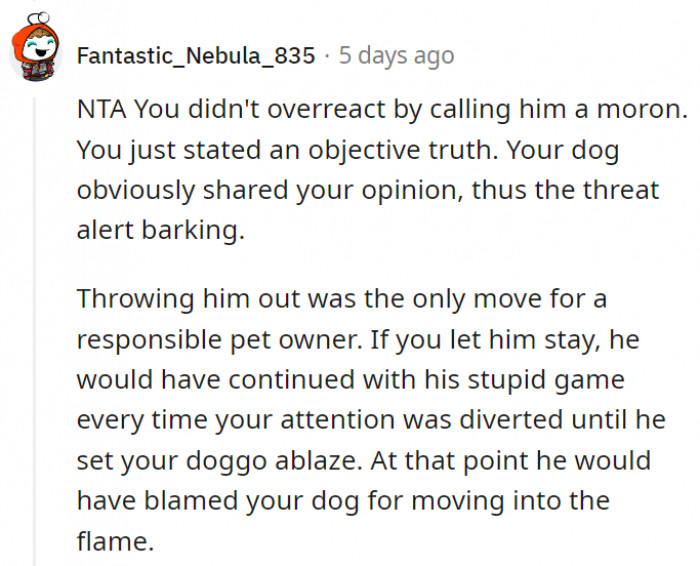
4. Romeo knew right away that Cedric wasn't the best guy around
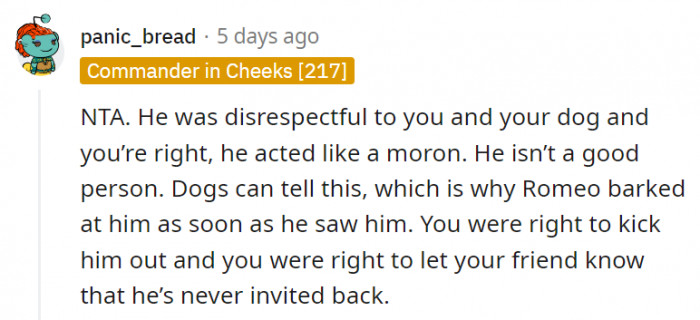
The Importance of Boundaries
Setting boundaries is vital in any relationship, including those involving pets.
Dr. Rebecca Miller, a clinical psychologist, emphasizes that establishing clear boundaries can protect both pets and owners.
In this case, asserting boundaries around acceptable behavior towards the dog can help mitigate future conflicts and ensure the pet's safety.
The Role of Conflict Resolution in Pet Ownership
When conflicts arise over pet care, it's essential to utilize effective conflict resolution strategies. Research indicates that conflicts in shared living situations can lead to significant emotional distress for all parties involved, especially when pets are involved.
According to the Journal of Family Psychology, utilizing communication techniques such as active listening and empathy can help de-escalate tensions and foster understanding.
Understanding Interpersonal Conflict Over Pets
Dr. Kevin Young, a social psychologist, explains that conflicts involving pets often reflect deeper issues of respect and boundaries within relationships.
His studies suggest that when individuals feel their bonds are undermined, it can lead to defensive and aggressive behaviors.
Recognizing these dynamics is crucial for resolving conflicts effectively.
5. Flicking a lighter on at an animals face is not a light thing
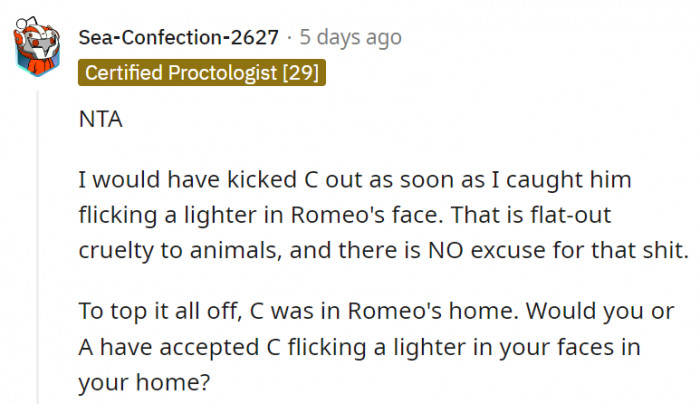
6. Other people would have gone the full lengths to protect their dog

7. Let's see if he still feels the same way then

To address this situation effectively, the Redditor might consider calmly discussing their concerns with the friend.
Expressing specific behaviors that are unacceptable can foster understanding and respect for the dog's well-being.
Using 'I' statements can help frame the conversation in a way that minimizes defensiveness.
To address situations like these, it may be beneficial to establish clear boundaries regarding interactions with the dog. Setting guidelines for acceptable behavior around pets and discussing these openly can help prevent future conflicts.
Additionally, creating an environment where all parties feel safe discussing their concerns about pet treatment can lead to healthier relationships among housemates.
To mitigate conflicts in such situations, open dialogue about boundaries and mutual respect can be beneficial.
Encouraging understanding of each other's perspectives can help prevent future confrontations.
Practically, initiating a conversation about acceptable behavior around pets may help establish ground rules that protect both the pet and the relationships involved.
8. That would have been satisfying

9. OP's dog immediately sniffed out the bad guy in the room

10. He wasn't being very nice in another person's home

The Impact of Stress on Pet Owners
Research suggests that stress can significantly affect how pet owners respond to perceived threats against their pets.
When feeling overwhelmed, individuals may react more intensely, driven by an instinctual need to protect their loved ones.
This reaction underscores the importance of managing stress to ensure more balanced responses in emotionally charged situations.
11. Even if it is their home, they should respect animals
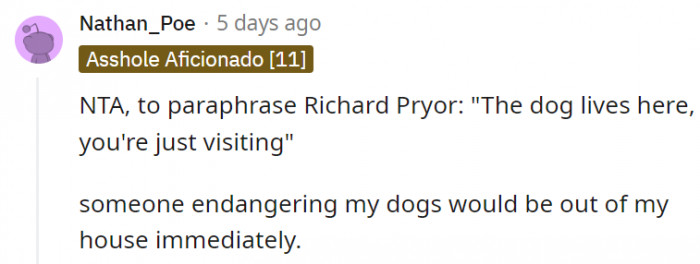
12. The situation was in need for it though

13. One single flame too near could have badly hurt the dog
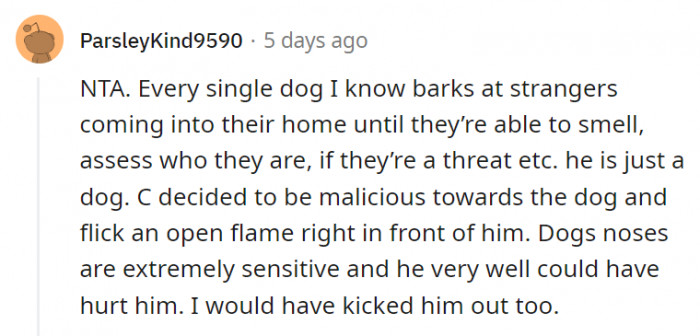
Ultimately, fostering an environment of support and understanding can help mitigate conflicts involving pets.
Encouraging open dialogue about acceptable behavior can enhance relationships and ensure the safety of the dog.
Participating in discussions around pet care can also strengthen the bond between the Redditor and their roommate.
14. Antagonizing an animal is just plain cruelty no matter what state you're in
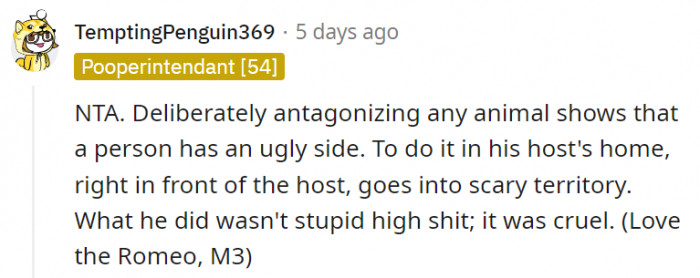
15. Maybe OP's roommate should reevaluate the friends he has
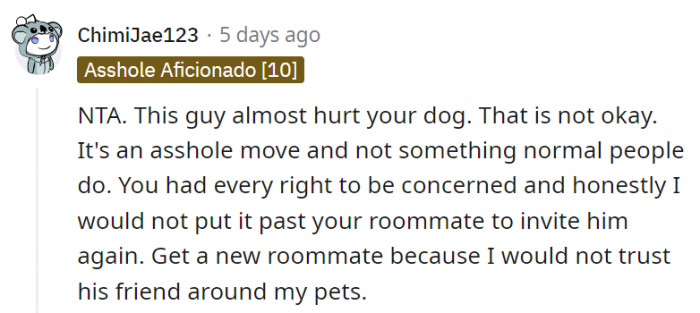
16. Keep him away from any pets in general

Navigating Conflict with Empathy
Empathy plays a crucial role in resolving conflicts involving pets.
Research shows that approaching disagreements with a mindset of understanding can lead to more positive outcomes.
Encouraging the friend to share their perspective may reveal underlying motivations and foster a collaborative solution.
17. If he doesn't respect the house he's going into, why bother letting him in

18. It's a good thing OP didn't wait for something worse to happen before he kicked the guy out
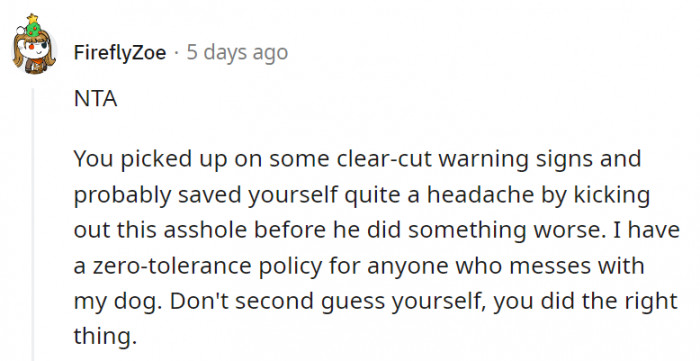
19. There is no excuse to be mean to animals

Ultimately, prioritizing communication and collaboration over confrontation can create a more harmonious living environment.
By working together to establish mutually acceptable boundaries, both the Redditor and their roommate can ensure the safety and well-being of the dog.
Such cooperative efforts not only protect the pet but also enhance interpersonal relationships.
20. The guy deserved the insults and so much more

Dogs are absolutely precious to some people and they would never allow anything no matter how small it is to happen to them. And rightly so.
Unfortunately for Cedric, he met someone who wasn't willing to let him mess around with his dog with his idiotic ways. And luckily for him, OP wasn't just about to go to hell and back with his ass just to teach him a lesson about being kind to animals.
If it were another fur parent, he might not have been so lucky.
Psychological Analysis
This situation illustrates the strong protective instincts that many pet owners feel, often rooted in their emotional attachment to their animals.
Understanding these dynamics can help in addressing conflicts and improving relationships.
Analysis generated by AI
Analysis & Alternative Approaches
In conclusion, protective instincts toward pets are often rooted in deep emotional connections that reflect broader relationship dynamics.
Psychological research highlights the importance of respect and understanding in resolving conflicts related to pet ownership.
By fostering open communication, individuals can navigate these challenges more effectively.
Analysis & Alternative Approaches
In summary, understanding the dynamics of pet ownership and human interaction is essential for maintaining harmony in shared living situations. Research underscores the importance of communication and respect for individual boundaries in fostering positive relationships, both for pets and their owners.
By addressing conflicts with empathy and clarity, housemates can work together to create a supportive environment for everyone involved.
Analysis & Alternative Approaches
Understanding the psychological motivations behind pet ownership can illuminate the protective instincts that drive owners to defend their pets.
Research indicates that fostering open communication and empathy is essential in navigating conflicts involving animals.
Ultimately, prioritizing collaborative discussions can lead to healthier relationships and enhanced well-being for all parties involved.



